Carl(os) Roa: It’s 2:00 p.m. PDT, and the four of us are staring at a monitor resting on top of a black rehearsal cube that looks like it was designed by Minimalist Artist #452. We’re in Portland, Oregon, and instead of being dazzled by the fact that this is the first gig I’ve ever been flown in for, I’m deeply frustrated. Two of our collaborators—our director, Rula(s) Muñoz, and our costume designer, Azaria Rubio—are between airports due to the Canadian wildfires, which have caused their flights to be delayed until the next day. Those of us who are in Portland are surrounded by cubes. So many cubes…
Scattered, but Not Apart: A Two-Sided Story
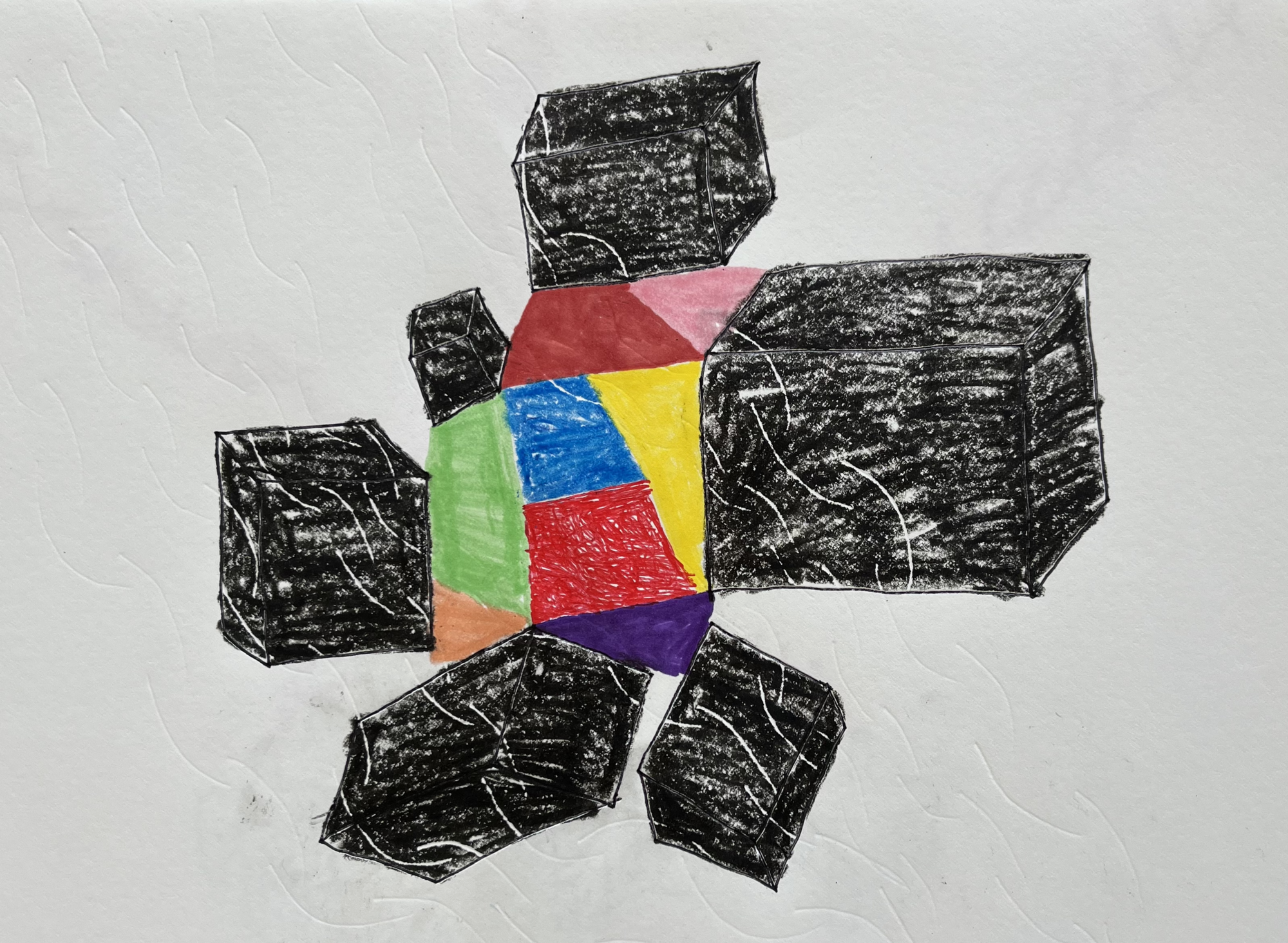
Sketch of rehearsal cubes by Carl(os) Roa.
When are Rula(s) and Azaria going to arrive? Am I being too grumpy? Should I be more grateful? Do my collaborators like me? Am I talking too much? Am I steering the ship too hard? How do I let go of my scarcity mentality? When I talk in public, do I sound performative? Is it appropriate to flirt with someone outside of my team? Should I just go to the Eagle instead? What even is my role in this process? If I take off my disguise, will everyone in this conference discover that I’m a wild, cantankerous slut who shouldn’t have been chosen in the first—
Hello there! My name is Carl(os) Roa, and I drew the sketch you see above. I am an interdisciplinary artist and storyteller, and yes, I’m aware that’s too many syllables for one title. Several months ago, I participated in the Latinx Theatre Commons (LTC) Designer and Director Colaboratorio, and it was easily one of the best artistic experiences I’ve ever had. The description I’ve written above might make that hard to believe, but stay with Rula(s) and me for this journey. Our team had a very non-linear process, and this article will also be… non-linear. Do not expect continuity. Do not expect cohesion. Do not expect order. Beyond this paragraph, there only exists chaos.
The level of artistry and humanity among the group was something exceptional, unlike anything I had experienced since immigrating to this country.
Rula(s) A. Muñoz: I made a deliberate decision to approach directing with an open mind, free of any preconceptions. My aim was not to reject my role as director but rather to allow the creative process to unfold naturally. Our goal with Colaboratorio was to find new ways to collaborate, different from the destructive methods that are common in white American theatre. I wanted to develop new tools to encourage horizontal collaborations rather than relying on the traditional hierarchical structure.
As both a director and deviser, I have always valued collaborative processes, and I was excited about creating a non-hierarchical environment. I decided to remove the power dynamic that often comes with the directorial position and instead act as a team member. However, this also meant that I couldn't always be present and sometimes had to rely on technology to communicate with the team.
Although I was unable to attend the first day with the rest of the cohort, I believe everything happens for a reason. I am grateful to have been a part of Colaboratorio, even though my experience was cut short. I learned so much from my fellow collaborators and the cohort as a whole. The level of artistry and humanity among the group was something exceptional, unlike anything I had experienced since immigrating to this country.
(os): Our team immediately began with a discussion of the play itself, which was called Sleep with the Angels by Evelina Fernandez. Immediately, we grappled with the play. After an hour-long discussion of the play’s themes, our scenic designer, Dominique Zaragoza (Dom for short), brought up the idea of breaking away from a proscenium or black box setup for a promenade staging, where the audience walks through an entire house to experience the play.
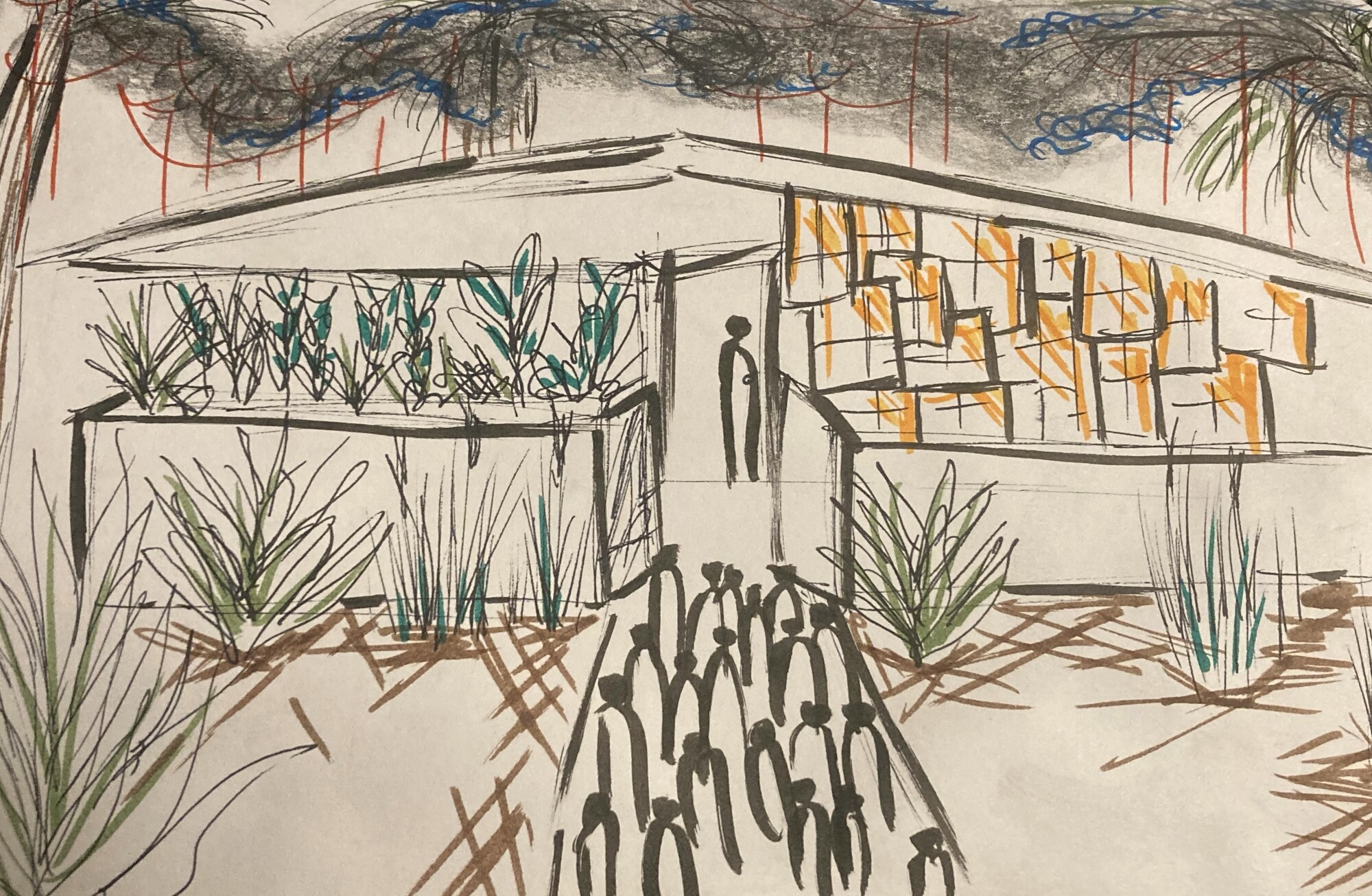
A conceptual sketch for the potential house that the audience would walk through, made by Dom.
From Dom’s idea, more ideas began to coalesce into clouds. Literal clouds, in fact. Ash Parra, our lighting designer, spent a lot of time with me in Cloudland. The vision was that each room of the house would look radically different from the next, and instinctively we both evaporated into atmosphere for a while.
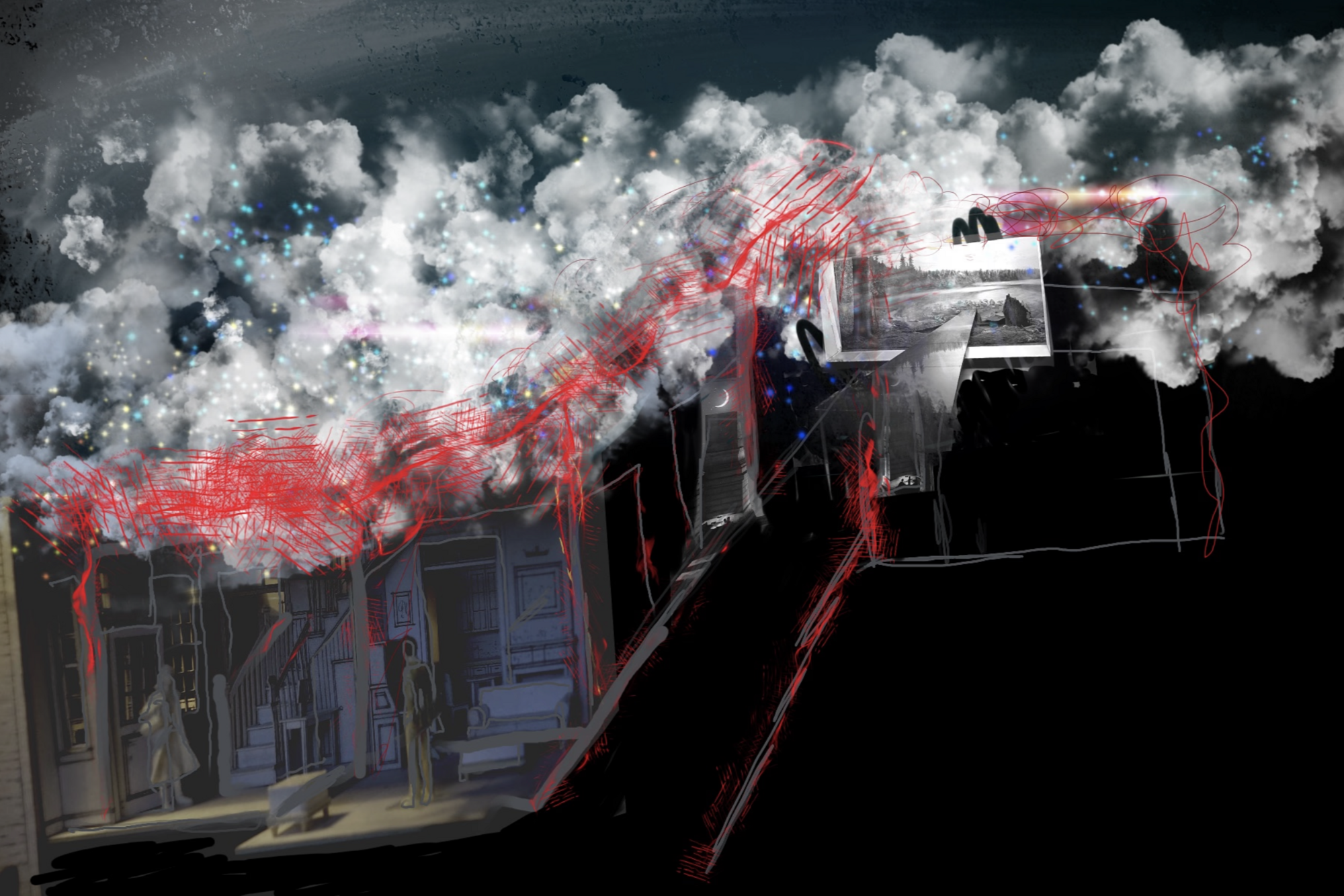
A rendering made by Ash Parra.
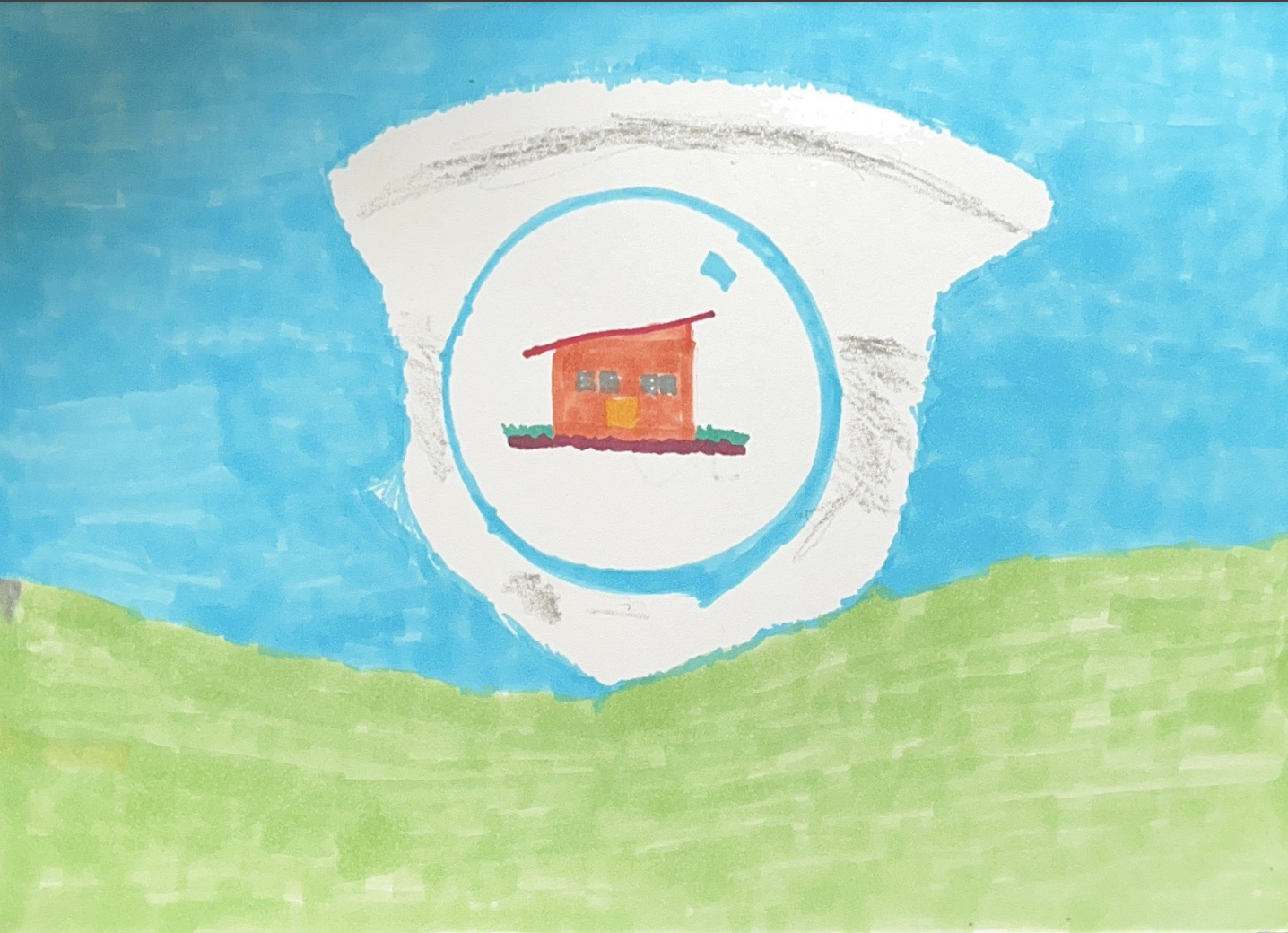
A sketch made by (os) Roa.
Michael Flores, our sound designer—who inspired our “non-linear” concept for this essay—played with the sounds of wind for his design. He went outside to experiment with different types of wind sounds: the sound of bags rustling in the wind, the sound difference of winds at high speeds, etc. To listen to Michael’s recording, click here.
Finally, costume designer Azaria Rubio created the mood board below and worked in tandem with the design team to develop much of the conceptual imagery for the set design. Although Azaria had to be remote for the first two days due to flight delays, she was able to participate for the greater half of Colaboratorio.
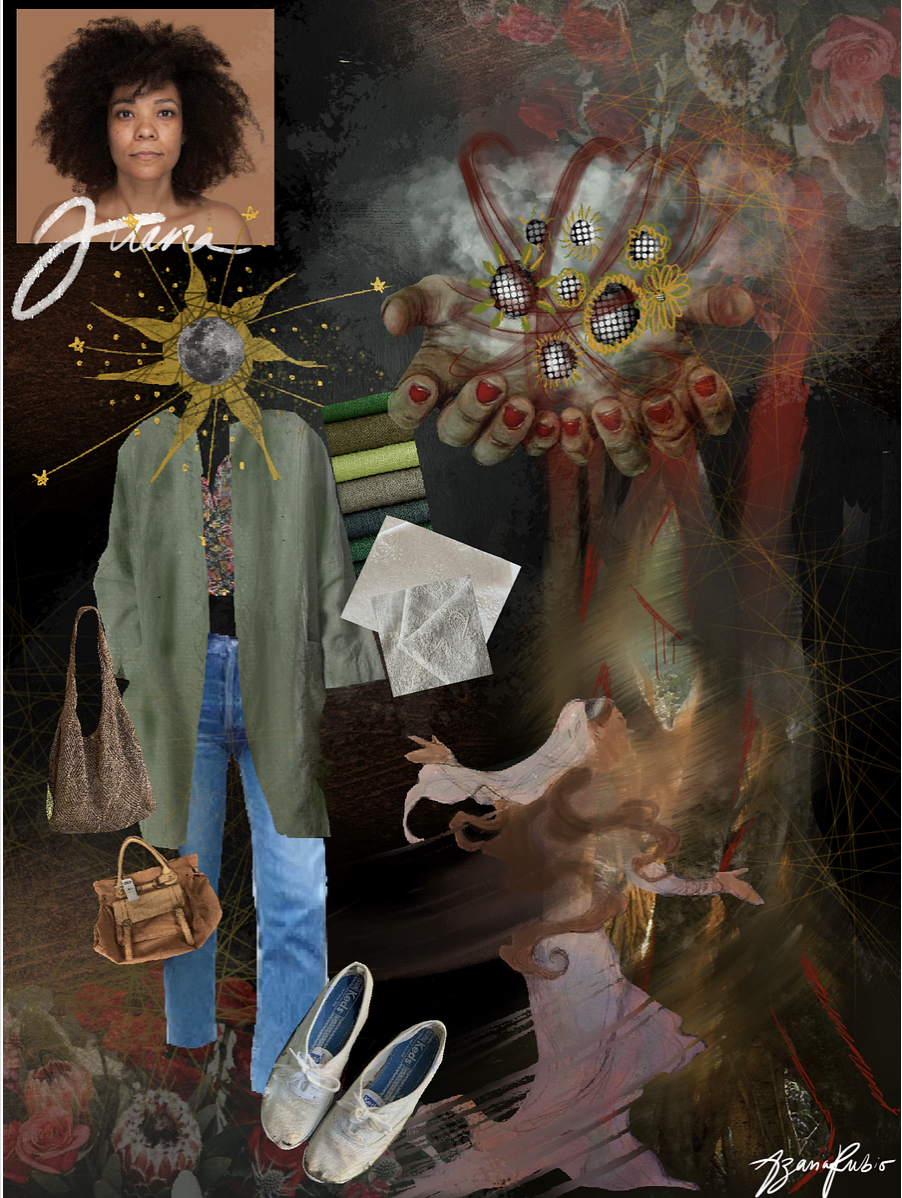
Mood board created by Azaria Rubio.
Rula(s): After the final presentations, which left me feeling incredibly inspired by everyone in the cohort, the co-champions treated us to delicious food once more to celebrate the culmination of the 2023 LTC Designer and Director Colaboratorio. It was a moment that not only fueled our spirits but also brought us all together as a community. As it was technically my first day, having arrived in Portland the night before, I was pleasantly surprised by the palpable sense of community that I felt. Everyone was welcoming, even though I was the last person to arrive. It was almost like The Last of the Mohicans. We walked together to our hotel from the venue where we had been working, the Children's Theatre, and made our way up to the second-floor lounge area, where we hung out and continued to connect. There were only a few times when I saw people who were not part of the cohort. We basically had the space to ourselves.
Despite the physical distance between us in that hotel bar on our last night together, we were still very much together. We were sharing our humanness, our time, and our souls. It felt like a big family gathering, even though technically, I was surrounded by strangers. But the generous spirit of those fantastic humans made me feel a sense of belonging from the moment I arrived. I felt safe and seen. As the evening drew to a close, we gradually started to say our goodbyes, knowing that most of us had flights to catch the next day. That night was intense, both physically and emotionally, as I was exhausted from all the traveling and yet filled with adrenaline from the amazing experience of meeting and connecting with so many wonderful artists and humans.
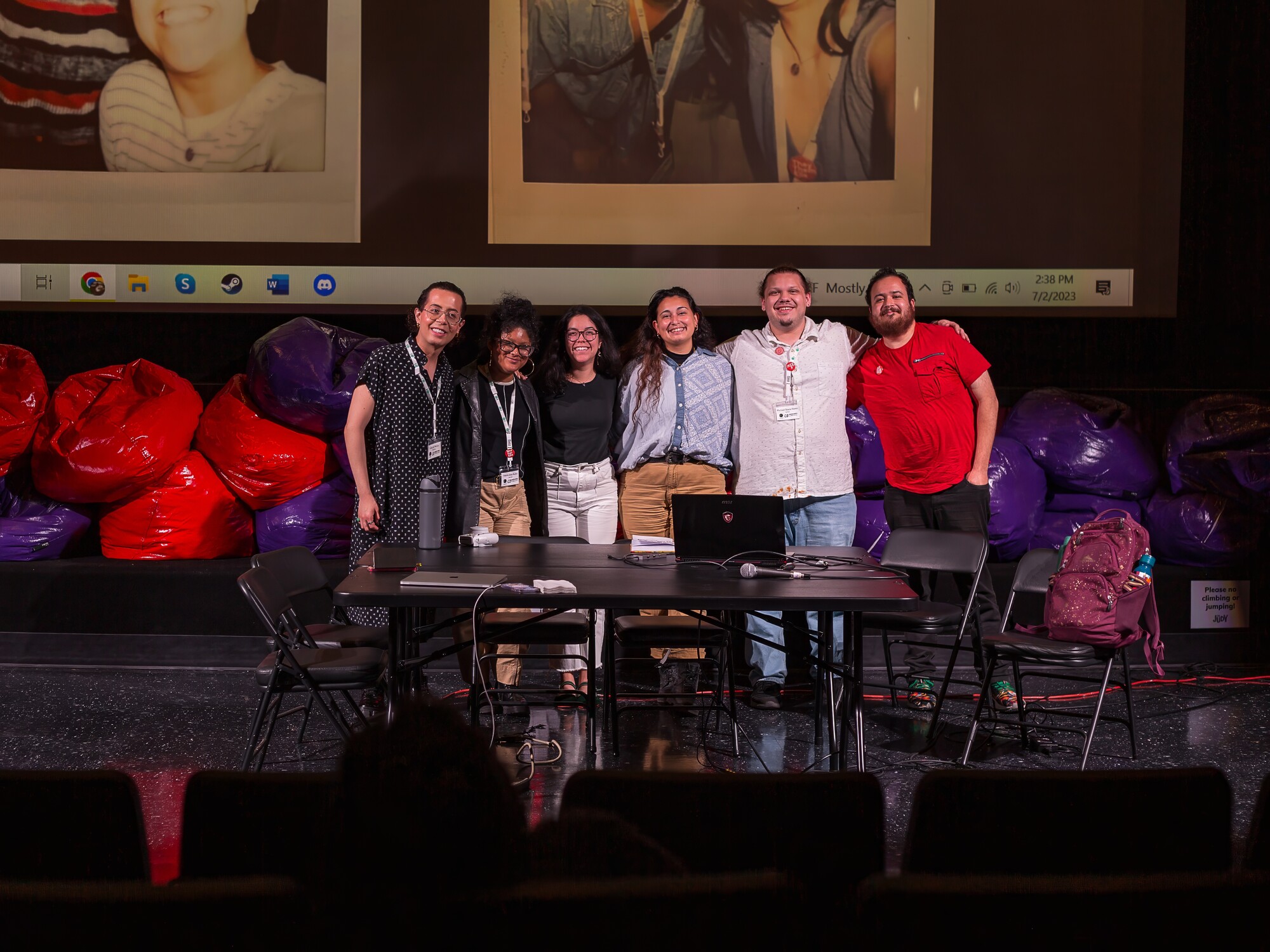
Rula(s) A. Muñoz, Azaria Rubio, Ash Parra, Dominique Zaragoza, Michael Flores, and Carl(os) Roa at the LTC Designer and Director Colaboratorio. Photo by Roy Arauz.
(os): Our process, as idyllic as it may seem, was not without struggle. For many of our collaborators, this was their first time working outside of a power dynamic determined by a director or theatre company. Typically, costume, sound, or lighting designers have their designs considered much later in the production process, a norm which Colaboratorio was intended to disrupt. To quote Azaria:
I’m so used to having to base my ideas off of someone else. I’ve never really explored including costumes [in the beginning], because whenever I’ve done a project where I’m doing the conceptualizing, I have somebody else doing the costumes. It’s been kind of rewarding because it makes me think, This is important. But also, ideally the concept is more cohesive because we’re going through these steps together.
Challenging the norms of timelines, workflow, and labor also came up as a frequent topic for our team. Working in theatre production is notoriously grueling labor, and the needs of people who work in production often become an afterthought. Or worse, they are expected to sacrifice their own comfort and leisure in solidarity with the production team.
I was also in the middle of a full-time program manager position at a community arts non-profit, and I found it very difficult to take off my facilitator hat and to just let the room steer its own conversations. Even my own official role as scholar/documentarian was something I felt the need to challenge or disrupt. In my experience, I’ve found writing about art to be such a passive experience, and I wanted to find a way to become an extension of the art itself. These drawings are a part of that effort.
But nobody faced more challenges than Rula(s). I’ll let her do the talking.
This is true freedom: to have the intimacy of not being recorded, and the agency to assign your own role for yourself.
Rula(s): It was Wednesday morning, and I had an important trip to attend. I was scheduled to fly from New York to Portland via Chicago for the 2023 LTC Designer and Director Colaboratorio. But as I woke up at 5:00 a.m., I received a text message notifying me that my second flight had been canceled. At first, I thought it would be easy to find another flight, but when I arrived at the airport, I realized many other people were going through the same thing.
I was worried about disappointing my team and the entire cohort. However, LTC producer Jacqueline Flores was very supportive and assured me I was not the only one facing this issue. The delays and cancellations were caused by the Canadian wildfire smoke passing through from New York state to the Midwest. Our costume designer, Azaria Rubio, was stranded in Santa Fe due to the same problem. Since we were all traveling from different parts of the country, the LTC co-champions decided that the staged reading of the play would be streamed over Zoom for everyone to watch. This was unexpected but a great solution given the circumstances.
At the airline counter, I was informed that the quickest way to get to Portland would take three days. I felt agitated because it meant I would miss out on the in-person interactions and experiences. Those three days went by so slowly. On day one, the staged reading of the play was streamed, and we had a Q&A with the playwright. But as soon as I closed my computer, I realized how out of place I felt. It was nobody's fault, but I wished things had gone as planned.
I couldn't help but reflect on how climate change caused by humans had disrupted our plans. And on the wind that was carrying all that smoke across the country. The wind plays a significant role in Evelina's piece.
(os): On our second-to-last day of Colaboratorio, I was alone in our shared studio. Where had everyone gone? Ash was just outside, enjoying the weather. Azaria, Dom, and Michael went out to a craft supply store to prepare for the presentation. Rula(s) was still on her way over from Los Angeles, and she would be arriving in Portland later that night. It occurred to me that in so many processes this amount of “unsupervised” time without a director was rare. Even in devised processes, there was an expectation that everyone showed up to stay in the same space to make work together. I felt inspired enough to make this:
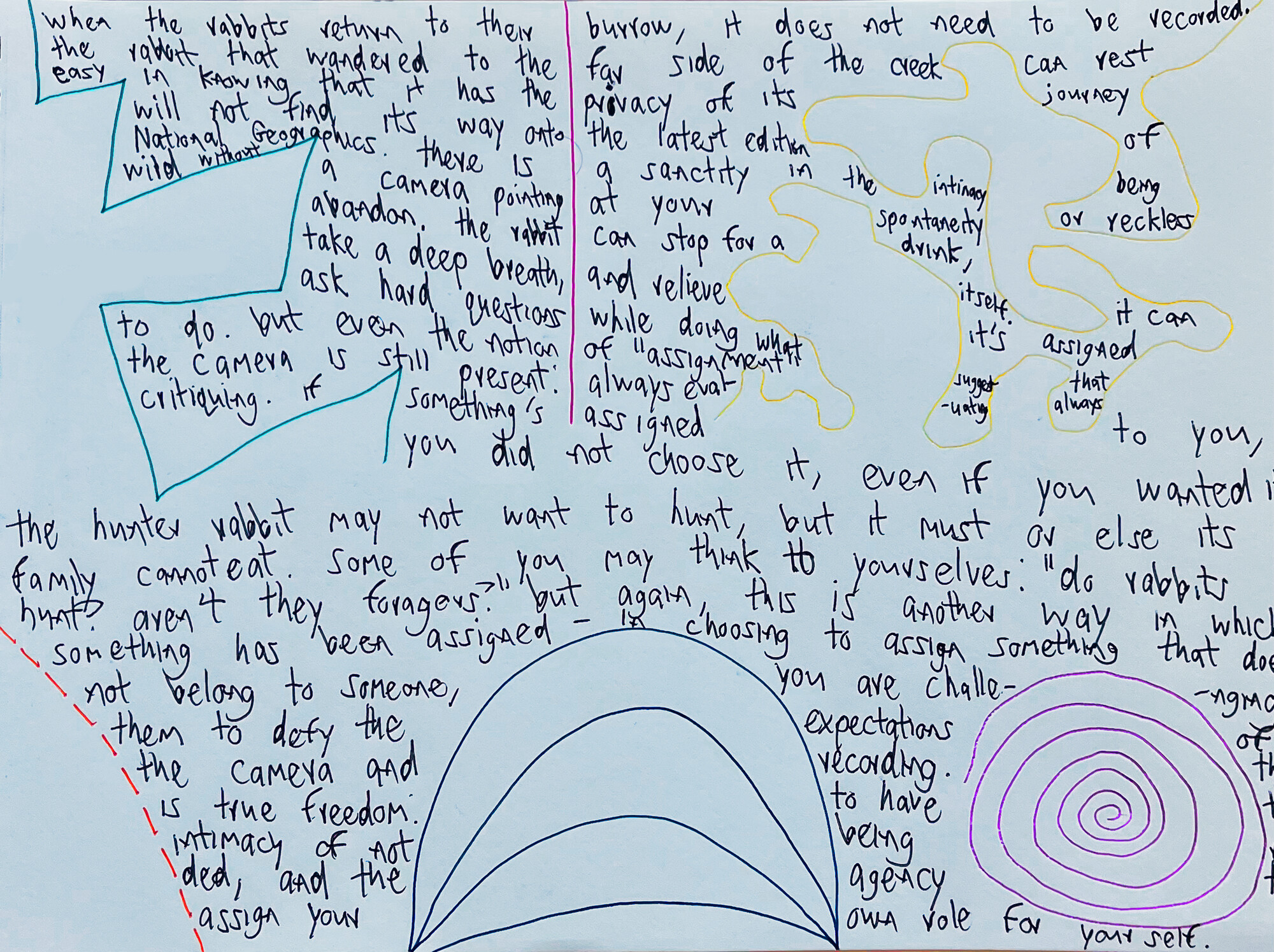
A drawing by (os) Roa.
Yes, I’m aware my handwriting sucks, so here’s the text:
When the rabbits return to their burrow, it does not need to be recorded. The rabbit that wandered to the far side of the creek can rest easy in knowing that the privacy of its journey will not find its way onto the latest edition of National Geographics. There is a sanctity in the intimacy of not being wild without a camera pointing at your spontaneity or reckless abandon. The rabbit can stop for a drink, take a deep breath, and relieve itself. It can ask hard questions while doing what it’s assigned to do. But even the notion of “assignment” suggests that the camera is still present: always evaluating, always critiquing. If something’s assigned to you, you did not choose it, even if you wanted it. The hunter rabbit may not want to hunt, but it must or else its family cannot eat. Some of you may think to yourselves: ‘Do rabbits hunt? Aren’t they foragers?’ But again, this is another way in which something has been assigned—in choosing to assign something that does not belong to someone, you are challenging them to defy the expectations of the camera and recording. This is true freedom: to have the intimacy of not being recorded, and the agency to assign your own role for yourself.
Rula(s): I was really looking forward to the Zoom reading. I'm a big proponent of virtual theatre. I know it's not the same as being there in person, but it's not trying to be. (I digress.) The first Zoom meeting felt like both a success and a failure at the same time. I was excited to finally begin the Colaboratorio but disappointed that we couldn't be together in person to start building community and making art. I was also eager to see the staged reading, witness the personal aesthetics the actors were bringing to the play, and have that experience inform my work as a collaborator. Unfortunately, it was impossible to hear anything on Zoom. There were always either connection issues or problems with the audio. However, I took advantage of the situation and read the play aloud, as I enjoy doing that anyway.
When we discussed the play in our first team meeting the next day, we all had different interpretations. (Azaria and I both gave up on Zoom and read the play on our own.) However, working through the play with the team was incredibly productive. Not only were their minds sharp and focused, but we all agreed and disagreed, made statements, and came to conclusions together to tell the story. Even though we were apart, we were able to feel and see each other as human beings and collaborators.
I knew that if I had such problems with mi gente, I had to vocalize them. Thankfully, I wasn’t the only one who had thoughts to share on this.
(os): Comfort and safety have never been emotions I’ve felt in Latinx spaces. As someone with deep-seated trauma over the cultural policing that happens in these spaces, I felt on guard for many of the open conversations we were invited to have with the other Colaboratorio participants. My instinct in these moments is to try and read the room to see how I can add to the conversation, but I was asked to sit directly in the middle for the inner circle to share my thoughts. Well, there goes subtlety.
I can’t quite remember the first question that was asked, but it was something along the lines of “What do you hope changes for the Latinx community?” My response was immediate. I am disgusted by the anti-Blackness and transphobia that is pervasive in the culture, as well as the erasure of our indigeneity. I knew that if I had such problems with mi gente, I had to vocalize them. Thankfully, I wasn’t the only one who had thoughts to share on this. Participants such as Miranda Gonzalez, Tamanya Garza, AnaSofia Villanueva, Daphnie Sicre, and Mateo Hernandez vocalized similar sentiments in ways I couldn’t have articulated myself.
What I learned from these conversations was that I actually can push back and express my pain in a Latinx space without having to worry about being ostracized… or at least, that might be true of the LTC. I can’t say how these conversations would go if I were still living in Bogotá, but at the very least I can feel proud to know that I’ve done it once, and I’ll continue to do it again. My trans existence, still burgeoning, was able to seek and identify other people who had the same struggles with Latinx environments. Learning this was perhaps the reason why Colaboratorio was one of the best artistic experiences I’ve ever had.
Rula(s): The final presentations, which I like to call the final sharing, were when I met the entire cohort. It was an incredible way for me to get to know them. I met them through their artistry, which is the most vulnerable place one can be. I was anxious because although we had a plan, I still felt like I needed more time with my team. Unfortunately, time was the only thing we couldn't have. So, we leaned on the trust we had developed during the three days before. It was a kind of trust that originated from the urge and willingness we all had to collaborate and make the best of our time at Colaboratorio.

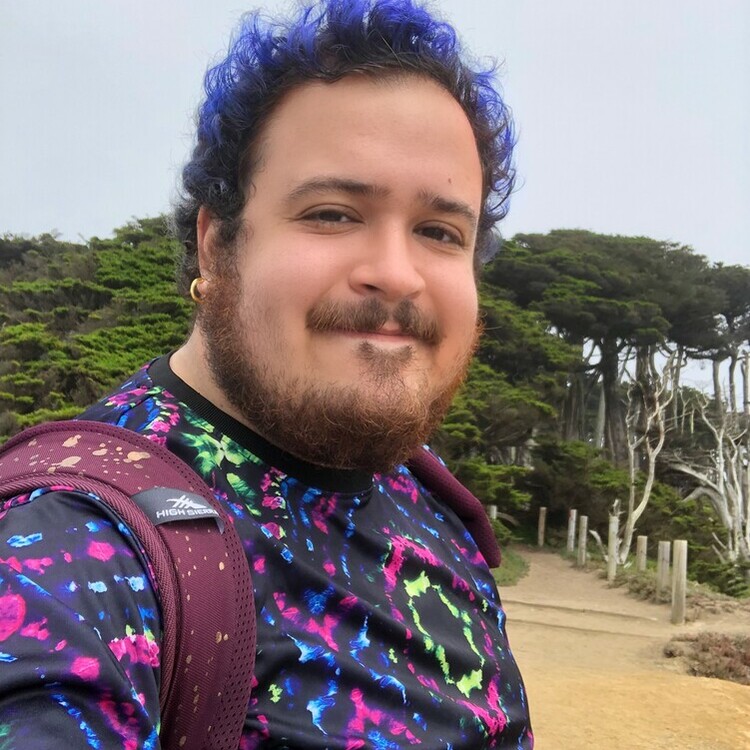
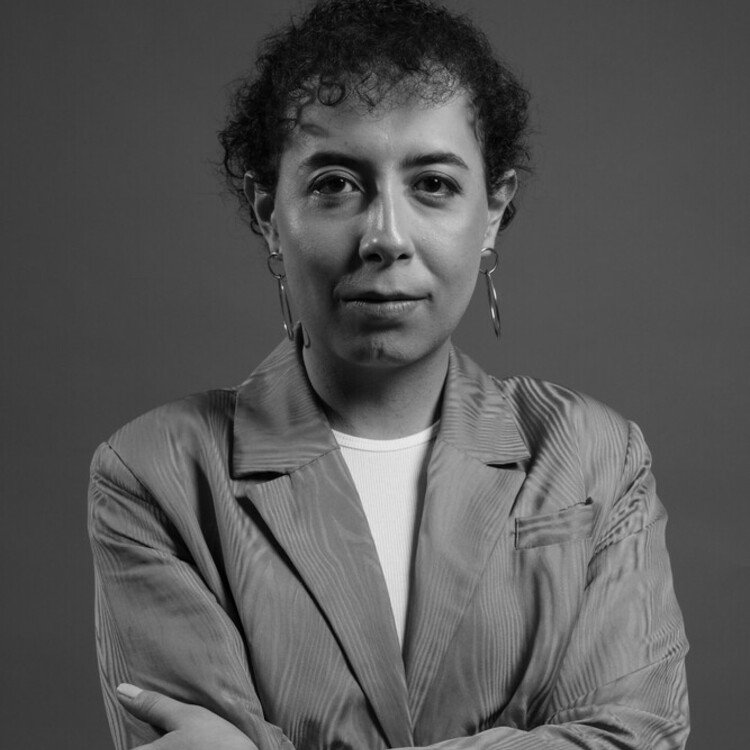
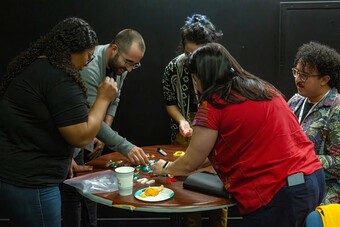

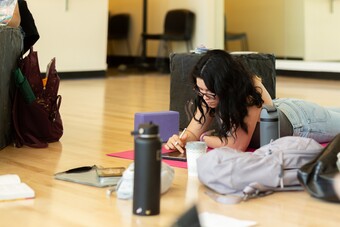

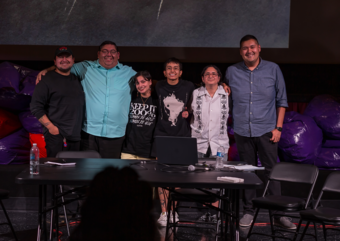

Comments
The article is just the start of the conversation—we want to know what you think about this subject, too! HowlRound is a space for knowledge-sharing, and we welcome spirited, thoughtful, and on-topic dialogue. Find our full comments policy here